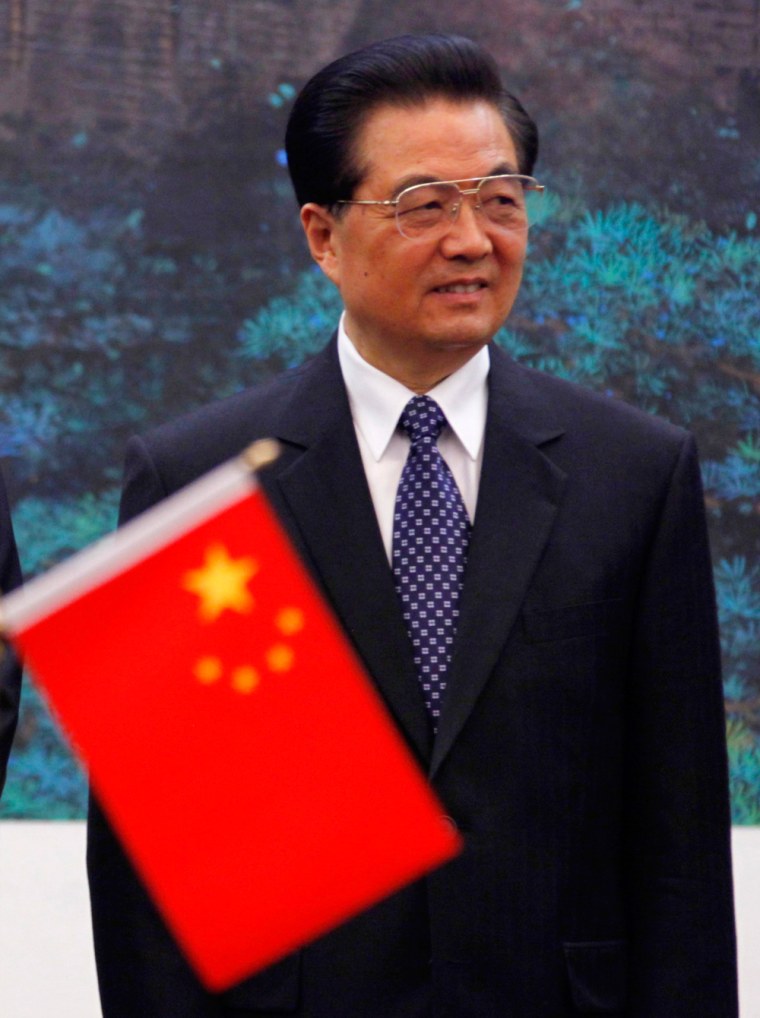Chinese President Hu Jintao urged an end to a "zero sum" Cold War relationship with the United States and proposed new cooperation, but resisted U.S. arguments about why China should let its currency strengthen.
Hu, who will visit Washington this week, struck an overall upbeat tone about ties with the United States in a rare written interview with two U.S. newspapers, the Wall Street Journal and the Washington Post.
"We should abandon the zero-sum Cold War mentality," he declared, and "respect each other's choice of development path."
Hu suggested cooperation with the United States in areas like new energy sources, clean energy, infrastructure development, aviation and space.
He also reassured foreign businesses in China that Beijing would continue to improve laws and regulations affecting them.
And he spoke encouragingly about the outlook for resolving tensions on the Korean peninsula, an area of concern to both Washington and Beijing.
But the Chinese president also indicated he does not accept U.S. arguments for Beijing to let its currency appreciate. Critics say China's undervaluing of the yuan gives it an unfair price advantage in international trade, contributing to the huge U.S. trade deficit.
Analysts thought Hu's generally conciliatory tone augured well ahead of his Washington meetings with President Barack Obama and other officials.
"Hu makes it clear that China intends to move forward on opening its markets, freeing up its exchange rate and restructuring its political system, but at its own pace and with little heed to external pressures for more rapid or broader reforms," said Eswar Prasad, a Brookings Institution economist and former International Monetary Fund official.
Last week U.S. Treasury Secretary Timothy Geithner said China would be better off letting its currency strengthen to cap inflation.
But Hu said China is fighting inflation with a range of policies including interest-rate increases, and "inflation can hardly be the main factor in determining the exchange rate policy."
He suggested that inflation was not a big headache, saying prices were "on the whole moderate and controllable." Inflation in China hit a 28-month high in November.
"We have the confidence, conditions and ability to stabilize the overall price level," Hu said.
U.S. lawmakers are among the biggest critics of China's exchange rate policy. Three Democratic senators -- Charles Schumer, Debbie Stabenow, and Bob Casey -- said on Sunday that they would propose legislation to try and fix the problem.
The legislation would impose stiff new penalties on countries that the Treasury Department designated as currency manipulators. The Treasury has not labeled any country a currency manipulator since July 1994 when it cited China.
Hu called the U.S.-dollar-dominated international currency system a "product of the past." He added that it would be a "fairly long process" to make China's own currency an international one.
He also said "the liquidity of the U.S. dollar should be kept at a reasonable and stable level." China has argued that the Federal Reserve's November decision to buy $600 billion in U.S. government bonds would undermine the greenback's value and lead to competitive currency devaluations by other countries. China is the largest holder of U.S. debt.
The Chinese president responded to complaints that China does not always treat foreign companies registered in China fairly. "Their innovation, production and business operations in China enjoy the same treatment as Chinese enterprises," he said.
"China will continue to improve laws and regulations concerning foreign investment ...." Hu said.
Bill Reinsch, president of the National Foreign Trade Council, said Hu "glosses over the many problems foreign companies have had operating in China," but added it was useful to have the head of China's government state its goals.
Questions were submitted to Hu by the two U.S. newspapers in late December, and the answers were released by the Chinese government on Sunday, The Washington Post said. (Click here for full transcript.) Hu said he sees "signs of relaxation" in tensions between North and South Korea, an issue of major concern to both Washington and Beijing.
"Thanks to joint efforts by China and other parties, there have been signs of relaxation," Hu said. He was convinced "an appropriate solution to the Korean nuclear issue" could be found, a reference to North Korea's nuclear arms programs.
